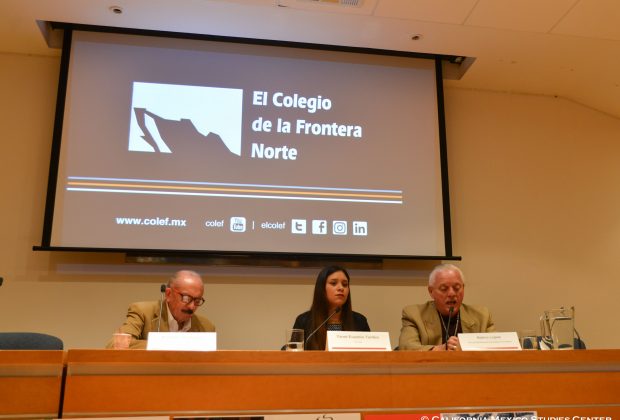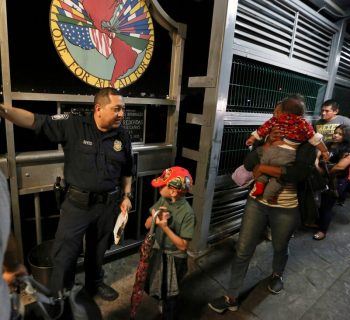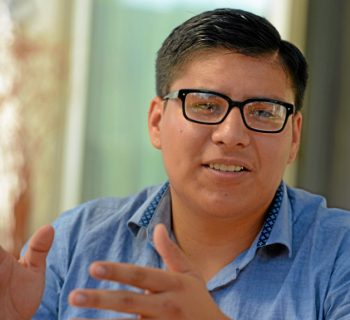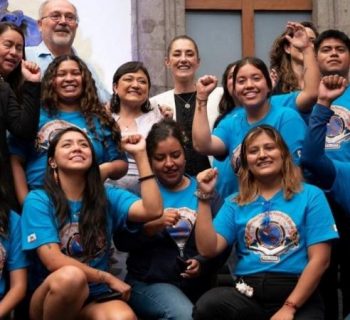Keynote at the International Seminar on Migration and Public Policy convened at the Colegio de la Frontera Norte on November 17-18th, 2016 in Tijuana, Baja California, Mexico – hosted by the California Mexico Studies Center and the Colegio de la Frontera Norte.
I would like to express my gratitude to those responsible for organizing this event – the California Mexico Studies Center led by Professor Armando Vazquez-Ramos and the Colegio de la Frontera Norte (the College of the Northern Border) hosted by Dr. Rodrigo Aguilar-Zepeda, and the other sponsoring organizations. It appears that we are barely waking up from the shock that we suffered from the unexpected election results in the United States in which Donald Trump prevailed as president-elect. He will assume the position officially on January 20th of next year.
What does the presidency of Donald Trump mean?
Before answering this specific question as it applies to immigration policy, which most concerns us at this moment, I would like to briefly make some observations about the elections.
There is no doubt that this represents an institutional failing of the Democratic Party at all levels and a foolishness of the supposed party experts who are responsible for conducting the polling, and also that of the corporate media. The so-called experts were unmasked as political novices. They bet on their political position and a candidate, and they merely repeated their own predictions over and over again. They ignored the obvious – the anger of the working people, and those of the middle class, both of the white race and those of color.
There has been an internal struggle within the Democratic Party during the past 45 years between the right-centrists and the left or progressives of the “New Deal,” and these two factions were represented by Hillary Clinton, on the one hand, and Bernie Sanders, on the other. Well, Clinton prevailed as the official candidate by way of many shady maneuvers, but in the end she lost the war, it can be said, to a political novice who had never been elected to a political office, and according to the polls, had more unfavorable opinions to his person than she had unfavorable opinions to hers.
What the statistics in hand demonstrate to us is that there was a serious decline in Democratic voters in key states that determined the election outcome – Ohio, Pennsylvania, Wisconsin, and Michigan in comparison to the 2008 elections with the election of the first African American president, Barack Obama, and in 2012 with his re-election. In this sense, the Democrats did not take care of their base and instead focused on other states called purple – not blue or red, in other words, Democrat or Republican – such as Colorado, Nevada, Florida, etc.
Curiously, Clinton won fewer votes than Obama did in the states mentioned previously, but Trump also received fewer votes than Mitt Romney in 2012. This tells us that both candidates garnered fewer votes, but Clinton was even worst. In this sense, Clinton represented the status quo or a continuation of the political-economic policies of Obama, while Trump represented “the change,” ironically.
One does not need to be a magician to conclude that there was a huge protest vote by the white working class, especially in the rural areas, but also by people of color – blacks, Latinos, and the youth and women in urban areas – that either simply opted in favor of Trump or just stayed home, the so-called passive protest vote.
These are the resentful ones from the economic crisis of 2008-2010 – the great loss of homes through bank foreclosures (estimated above 10 million, nationally) and jobs; and no relief for families, but instead for the banks (to the tune of hundreds of billions of dollars, and probably more). It has been reported, for example, that whites suffered a collective loss of wealth in the amount of 20 to 25 percent, Latinos in the amount of 40 percent, and African Americans in the amount of 50 percent of their collective wealth during the years referred to above. In terms of collective wealth I am referring to the equity contained in their home properties, the family home.
The last economic crisis resulted in a dramatic decline of the standard of living, income, wages, and quality of employment – less full-time employment and more part-time positions at minimum wage levels with no benefits. And, although there has been much talk about the supposed economic recovery, the majority of workers have not experienced it.
For both white workers and those of color, who before 1994 enjoyed more employment represented by a union and all that this represents in terms of wages and benefits in a collective bargaining contract, these were the most adversely affected by the “free trade” agreements negotiated by the traditional politicians of both political parties. Notwithstanding this reality, Obama and Clinton insisted on approving the Trans-Pacific Trade Agreement, called the TPP, which trade unions have labeled NAFTA on steroids. In reality, they ignored the political base of their own party.
On the other hand, the Latino vote in these elections was not so out of place from the common experience of other Democratic sectors. It is estimated that the Latino vote increased by 2 million voters in comparison with 2012. However, according to Antonio Gonzalez of the Willie C. Velasquez Institute, Latinos did not vote for Clinton as was hoped for, although this vote did allow Clinton to win in the states of Colorado, and Nevada, and be competitive in Arizona, and win by an overwhelming majority in California. It is estimated that she garnered 65 percent of the Latino vote to Obama’s 71 percent in 2012.
Latinos have also been strongly hit by the economic crisis, the huge loss of homes to bank foreclosures, and jobs, wage stagnation, and have also suffered something very special – the deportation of 2.6 million of their family members – 96 of whom are Mexican and Central American; the permanent incarceration of 35,000 migrants; the rejection of unaccompanied Central American minors as they reach the southern U.S. border fleeing violence, human trafficking, and drug traffic in their respective countries of origin; and the prolonged incarceration of Central American mothers and children in private detention centers. Basically, this is the legacy of the first black president of the United States – deporter-in-chief.
According to exit-poll surveys, between 27 to 29 percent of Latinos voted for candidate Trump. Although this statistic appears shocking, it is not so different from previous presidential elections, for example, 27 percent voted for Mitt Romney in 2012 and 31 percent for John McCain in 2008. It is recognition of a persistent conservative wing of the Latino electorate, but it also reflects a protest vote against the system that has not offered any substantive economic relief to this community.
Although, Clinton won the popular vote by a projected 2 million votes, Trump won the majority of votes from the Electoral College, a vestige of the electoral system established with the creation of the American republic by its founders to protect the interests of slave owners.
So, then, what does president-elect Trump intend for undocumented migrants and the immigrant communities? Without going too far in discussing his political campaign speeches, I dare say that he intends on doing more of the same that we have experienced during the past eight years.
The scape-goat is the inglorious role reserved for us as has historically been the case with both Democratic and Republican administrations. Trump recently declared in a nationally televised program this past Sunday, that his intention upon assuming his charge is to launch a massive deportation of “criminal” migrants according to his broad definition – between 2 to 3 million.
By way of a clarification, he defines a criminal as someone who has been returned to their country of origin for lack of legal documents and who returns to the U.S. without permission. Second, the construction of the border wall and/or fence along the southern border with Mexico – according to Trump, secure the southern border – more than it has already been built with the 650 miles of fencing and the 20,000 border patrol officials. Third, the possible cancellation of all executive orders issued by Obama, such as the Deferred Action for Childhood Arrivals program, known as DACA (some 750,000 young people who have surrendered their information, photos, and fingerprints to the Immigration Service), and the Temporary Protected Status program, known as TPS (another 240,000 Central Americans), which was established under other administrations but extended y Obama.
He speaks vaguely about a partial or tenuous regularization of migrants who have been in the U.S. for long periods, but does not offer any details; and establishing a temporary worker program, or bracero, or guest-worker in recognition of the need for cheap labor in agriculture and the service sector.
How does this differ from the immigration policy of President Obama? It differs almost in absolutely nothing, with the exception of DACA and the continuation of TPS.
A fair and humane immigration policy represents for us of the Hermandad Mexicana Nacional, the original charter, the oldest and most experienced Mexican migrant and immigrant organization in defending the rights of migrants and immigrants, founded in 1951 during the great deportations of 1.5 million Mexicans under the name of Operation Wetback by the presidents Harry Truman (Democrat) and then Dwight D. Eisenhower (Republican); along with the National Immigration Coordinating Committee 2016, the following:
- Stop deportations and the separation of families.
- Respect for due process rights and judicial defense against all deportations
- Respect for and continuation of DACA and TPS.
- Legalization of all undocumented migrants currently in the country similar to the Immigration Reform and Control Act of 1986, known as the amnesty program, established under the Ronald Reagan administration, a Republican president.
- The recognition of and acceptance of the unaccompanied Central American minors as refugees without incarceration, and the liberation of those currently incarcerated.
- Recognition of the right of return of those previously deported from the United States in order to legalize their status under a new immigration reform law – including the deported U.S. military veterans and the deported spouses of permanent residents and U.S. citizens for having entered the U.S. without permission.
- Reduction of random incarceration of the detained individuals without legal immigration status, accord them the right to bail and reunite with their families while they await the adjudication of their legal deportation processing.
- Cancellation of private contracts with private detention centers and jails.
We are living in a historic moment that requires a response to the level of the threat and danger represented to Mexican, Central American, and other migrant families of other countries. We know that we will be the first target of the new administration, and therefore, we assume a special responsibility which corresponds to us in order to give a resounding response.
We make a call for a massive mobilization on January 20th of next year throughout the country wherever we reside to protect that which is most sacred to us – our families – under the slogan NO DEPORTATIONS NOR SEPARATION OF FAMILIES AND LEGALIZATION FOR ALL!
By: Nativo Vigil Lopez, Senior Advisor to Hermandad Mexicana Nacional “La original”
HACIA UNA REFORMA MIGRATORIA JUSTA Y HUMANA
Conferencia Magistral en el Seminario Internacional Sobre Migración y Política Publica: Retos que enfrentarán los inmigrantes en Estados Unidos y México en 2017
Muchas gracias a las personas responsables por organizar este evento – Centro de Estudios California México dirigido por el Profesor Armando Vazquez-Ramos y el Colegio Frontera Norte (nombre) y las demás organizaciones patrocinadoras. Parece que estamos a penas despertando del choque que sufrimos por los resultados no esperados de las elecciones en Estados Unidos en donde quedo Donald Trump como el presidente-electo. Tomara posesión del cargo oficialmente el 20 de enero del próximo año.
Que significa la Presidencia de Donald Trump ? Antes de responder a esta interrogación especifica en cuanto a política migratoria lo que más nos concierna en estos momentos, quisiera brevemente hacer algunas observaciones sobre las elecciones.
No cabe duda que representa una falla institucional del partido demócrata a todos los niveles y una ridiculez de los supuestos expertos políticos del partido en llevar a cabo las encuestas y también de los medios corporativos de comunicación. Los dizques expertos fueron desenmascarados como novatos en la política. Apostaron en una posición política y un candidato y simplemente repitieron sus propios pronósticos. Ignoraron lo obvio – el coraje de la gente trabajadora y los de la clase media tanto de raza blanca y no-blanca.
Ha habido una pugna interna dentro del partido demócrata durante los últimos 45 años entre los centristas de derecha y los izquierdistas o progresistas estilo “New Deal” y estas dos facciones fueron representadas por Hillary Clinton, por un lado, y Bernie Sanders por el otro. Pues Clinton prevaleció como la candidata oficial por medio de muchas maniobras sucias, pero al fin y al cabo perdió la guerra se puede decir al perder contra un novato político que nunca antes había sido elegido a algún cargo político y según las encuestas tuvo mas opiniones desfavorables a su persona que las opiniones desfavorables contra ella.
Lo que las estadísticas en mano nos muestran es que hubo un declive serio de votantes demócratas en los estados claves que determinaron el resultado de esta elección - Ohio, Pennsalvania, Wisconsin, y Michigan en comparación a las elecciones de 2008 con la elección del primer presidente afro-americano Barack Obama y en 2012 con la re-elección del mismo. En este sentido los demócratas descuidaron a su base y se enfocaron en otros estados llamados morados – ni azul ni rojo o sea demócrata ni republicano – como son Colorado, Nevada, Florida, etc.
Curiosamente Clinton ganó menos que Obama en los estados anteriormente mencionados, pero Trump igual ganó menos que Mitt Romney en 2012. Quiere decir que los dos candidatos jalaron menos votos, pero Clinton fue peor. En este sentido Clinton representó el estatus quo o una prolongación de la política económica de Obama mientas Trump representó “el cambio,” irónicamente.
Uno no tiene que ser mago para concluir que hubo un gran voto de protesta de la clase trabajadora blanca, especialmente en las áreas rurales, pero también de los pueblos de color - negros, latinos y los jóvenes y hasta las mujeres en las áreas urbanas – o simplemente optaron por Trump o se quedaron en casa, la llamada protesta pasiva.
Son los resentidos por la crisis de 2008-2010 – la gran pérdida de casas (cerca de 10 millones embargos por los bancos) y empleos y nada de alivio para las familias, pero si para los bancos (por cientos de miles de millones). Se ha reportado, por ejemplo, que los blancos sufrieron una reducción de entre 20 a 25 por ciento de su riqueza colectiva, los latinos el 40 por ciento y los africanos-americanos el 50 por ciento de su riqueza colectiva durante los años referidos arriba. De la riqueza colectiva se refiere a la plusvalía que contenía las propiedades o sea el hogar familiar.
La última crisis económica resultó en un declive dramático del nivel de vida, los ingresos, sueldos y calidad de empleo – menos empleos de tiempo completo y más de tiempo parcial y de sueldos de pago mínimo sin beneficios. Y a pesar de que se ha hablado mucho de una recuperación económica, los trabajadores en su mayoría no la han experimentado.
Para los trabajadores blancos y no-blancos que antes de 1994 gozaban de empleos de sindicato con todo lo que esto significa en cuanto a sueldos y beneficios de contrato colectivo de trabajo fueron los más afectados adversamente por los tratados de libre comercio negociados por los políticos tradicionales de ambos partidos políticos. No obstante, esta realidad, Obama y Clinton insistían en aprobar el Tratado Trans-Pacifico, el llamado TPP, que los sindicatos lo califican como TLC en esteroide. De plano ignoraron a la base de su partido.
Por otro lado, el voto latino en estas elecciones no fue algo fuera del común de los demás sectores demócratas. Se calcula que aumentó el voto latino por 2 millones en comparación a 2012. Mas, sin embargo, según Antonio Gonzalez del Instituto Willie C. Velásquez, los Latinos no salieron a votar por Clinton como se esperaba a pesar de que este voto por Clinton le permitió ganar los estados de Colorado y Nevada y competir con Trump en el estado de Arizona, y ganar por una abrumadora mayoría en el estado de California.
También los Latinos han sido fuertemente golpeados por la crisis económica, la gran pérdida de casas y empleos, estancamiento de sueldos y mas a parte han sufrido algo muy especial – la deportación de 2.6 millones miembros de sus familias – 96 por ciento mexicanos y centroamericanos; el encarcelamiento de 35,000 seres migrantes permanentemente; el rechazo de los centroamericanos menores de edad no-acompañados al llegar a la frontera sur huyendo la violencia, tráfico humano y narcotráfico en sus países; y el encarcelamiento de madres e hijos centroamericanos en centros de detención.
Básicamente esto es el legado del primer presidente negro de los Estados Unidos – deportador en jefe. Según reportes entre 27 y 29 por ciento de los latinos votaron por el candidato Trump. Aunque parece espantosa esta cifra, no fue tan diferente de elecciones presidenciales anteriores, por ejemplo, 27% por Mitt Romney en 2012 y 31% por John McCain en 2008. Reconoce que existe un ala conservadora persistente en el electorado latino, pero también un voto de protesta contra el sistema que no ha ofrecido alivio económico.
A pesar de que Clinton ganó el voto popular por cerca de 2 millones de sufragios, Trump obtuvo la mayoría de votos del colegio electoral, un vestigio del sistema electoral establecido con la creación de la republica americana para proteger los intereses de los dueños de esclavos.
¿Entonces que pretende el presidente-electo Trump con los migrantes sin documentos? Sin ir muy lejos en hablar sobre sus discursos de campaña política, me atrevo decir que mas de lo mismo que hemos vivido durante los últimos ocho años.
El chivo expiatorio es el papel que nos reserva de nuevo como históricamente nos han tratado tanto administraciones demócratas como republicanos. Acaba de declarar en un programa televisado nacionalmente el domingo pasado que su intención al tomar posesión del cargo es la deportación masiva de los migrantes “criminales” según como los define muy ampliamente – entre 2 a 3 millones. Como punto de aclaración – define un criminal como alguien que haya sido regresado a su país de origen por falta de documentos y luego la persona regresa a Estados Unidos sin permiso.
Segundo, la construcción del muro y/o valla a través de la frontera sur con Mexico – según Trump, asegurar la frontera sur – más de lo que ya está con los 650 millas de valla y 20,000 oficiales de la patrulla fronteriza; tercero, la posible cancelación de todas las órdenes ejecutivas otorgadas por Obama como son el programa de acción deferida, DACA por sus siglas en inglés (unos 750,000 jóvenes que ya entregaron sus datos, fotos, y huellas digitales al Servicio de Inmigración) y el programa de estatus protegido temporal, la TPS (otros 240,000 centroamericanos) que se había establecido bajo otras administraciones pero extendido por Obama.
Habla de la regularización parcial o tenue de los migrantes de mayor tiempo en el país sin dar detalle alguno; y establecer un programa de trabajadores temporales o braceros o huéspedes en reconocimiento de la demanda por mano de obra barata en la agricultura y el sector de servicios.
Que tiene de diferencia con la política migratoria de Presidente Obama ?
Casi absolutamente nada, con la excepción de DACA y la continuación de TPS.
Una política migratoria justa y humana significa para nosotros los de la Hermandad Mexicana Nacional, la organización mexicana migrante mas antigua y experimentada en defender los derechos del migrante, fundada en 1951 durante las deportaciones de 1.5 millones de mexicanos bajo el nombre de Operación Espaldas Mojadas por los presidentes Harry Truman (demócrata) y luego Dwight D. Eisenhower (republicano), conjuntamente con la Coordinadora Nacional 2016 por una Reforma Migratoria Justa y Humana, lo siguiente:
- Alto a las deportaciones y la separación de familias.
- El respeto a los derechos de debido procedimiento legal y defensa judicial contra la deportación.
- El respeto y la continuación de los programas DACA y TPS.
- Una legalización de los migrantes sin documentos existentes en el país semejante al programa llamado amnistía que se estableció bajo la administración de Ronald Reagan, un presidente republicano.
- El reconocimiento y la aceptación de los menores de edad no-acompañados como refugiados sin la encarcelación y la liberación de los encarcelados actuales.
- El reconocimiento del derecho de los deportados a regresar a los Estados Unidos para legalizarse bajo una nueva reforma de ley de inmigración incluyendo a los veteranos deportados y los conyugues deportados por haber entrado al pais sin permiso.
- La reducción de la encarcelación de los detenidos por falta de un estatus legal migratorio o sea salir libre bajo fianza y reunificarse con sus familias mientras se lleva a cabo el proceso judicial de deportación.
- La cancelación de contratos con los centros de detención privados – cárceles privados.
Estamos viviendo un momento histórico que requiere una respuesta a la altura del peligro que representa para las familias mexicanas, centroamericanas y migrantes de otros países. Sabemos que seremos nosotros el primer blanco de ataque de la nueva administración y por lo tanto asumimos la responsabilidad que nos corresponde dar una respuesta contundente.
Hacemos un llamado a una movilización masiva el 20 de enero del próximo año por todo el país donde estemos radicando, para proteger lo más sagrado: la familia, con el lema:
NO DEPORTACIONES NI SEPARACIONES DE FAMILIA Y LEGALIZACION PARA TODOS !!
Muchísimas gracias.
Nativo Lopez-Vigil
Tijuana, Baja California ~ 17 de noviembre, 2016







